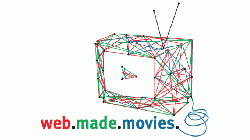Drumbeat/webmademovies/one page 2.0: Difference between revisions
Brettgaylor (talk | contribs) |
Brettgaylor (talk | contribs) No edit summary |
||
| Line 3: | Line 3: | ||
[[Image:Web.made_.movie_marquee.gif|left|250px]] | [[Image:Web.made_.movie_marquee.gif|left|250px]] | ||
'''WebMadeMovies is Mozilla's open video lab'''. We're gathering the world's most innovative filmmakers | '''WebMadeMovies is Mozilla's open video lab'''. We're gathering the world's most innovative filmmakers, hackers and artists to imagine how open video technologies can re-invent video on the web. | ||
= The problem: black boxes and walled gardens<br> = | = The problem: black boxes and walled gardens<br> = | ||
Revision as of 21:03, 23 June 2010
WebMadeMovies is Mozilla's open video lab. We're gathering the world's most innovative filmmakers, hackers and artists to imagine how open video technologies can re-invent video on the web.
The problem: black boxes and walled gardens
Video today is *on* the web, but not *of* the web. Despite the innovation that's swept other online media, most video -- from information and entertainment to educational videos and user generated content -- is still trapped inside closed platforms that are difficult or impossible to search, link, quote or contextualize. We can "embed" video in pages, but only through closed-off players that are sealed off from the content around them. And that still behave much like traditional TV.
Creators that want to break with convention are forced to use multimedia systems like flash that cannot inter-operate with the rest of the web. To make matters worse, other filmmakers cannot learn from or build on these sites because the source code is hidden - the "view source" functionality of the web is broken.
All this traps video inside a virtual "black box," robbing it of audience and potential. And locking an entire branch of knowledge and creativity in closed systems that don't behave or innovate like the rest of the web.
All that's set to change. Unlocking video's 21st century potential.
New open video tools and standards like HTML5 allow us to throw open this closed black box. And weave video right into the fabric of the social web. As influential industry players move away from closed platforms like Flash, and as the devices people use to watch and produce video continue to rapidly evolve, the stars are aligning to build a more open video future. This represents a unique opportunity to take video in a whole new direction. What's needed now are the skills and artistic vision to innovate and give the world a taste of what's possible.
An open source film studio
WebMadeMovies will leverage Mozilla's convening power to create a vibrant, bustling studio of independent filmmakers, CSS hackers, cross-media scriptwriters, Javascript wizards, PHP developers and graphic designers - all working as a team to create cutting edge web experiences.
We're inviting storytellers to work with us to innovate not only technology, but how storytelling and narrative can evolve when woven into the web. We want to showcase what the open web can deliver as a platform that closed systems can't.
We've already gotten to work, kickstarting the process with a series of demos that put these ideas into action. We've picked compelling examples of open source projects around the world to film, and are creating custom interfaces that speak to the content of each video.
We've also sparked development on a set of technologies that open video needs right now, including popcorn.js - a Javascript library that lets video interact with the rest of the web, mashing up google maps, image feeds, twitter accounts and other semantic data.
Lets Blow Up Your Video
Imagine...
- clicking on a documentary or news subject to instantly see their Wikipedia entry
- searching the entire history of TV, news and film as easily as you search Google
- watching a video about the Gulf oil spill recorded weeks ago -- with a map of the spill's current size right now in real time
- educational films that dynamically update their content with the rest of the web, never going out of date
- custom interfaces tailored to each film, marrying the medium to the message. Travel films that interact with your phone's GPS. A documentary about the ocean through a player that looks and feels like water.
- mashing up search and Twitter feeds with maps and news footage to create a visual monitor of what the planet is thinking about
- creators and audiences collaboratively producing footnotes that add a rich data layer to videos
Open video tools like HTML5 can make all this -- and applications we can't yet imagine -- possible. Cutting-edge hackers, artists and filmmakers will make it a reality.
